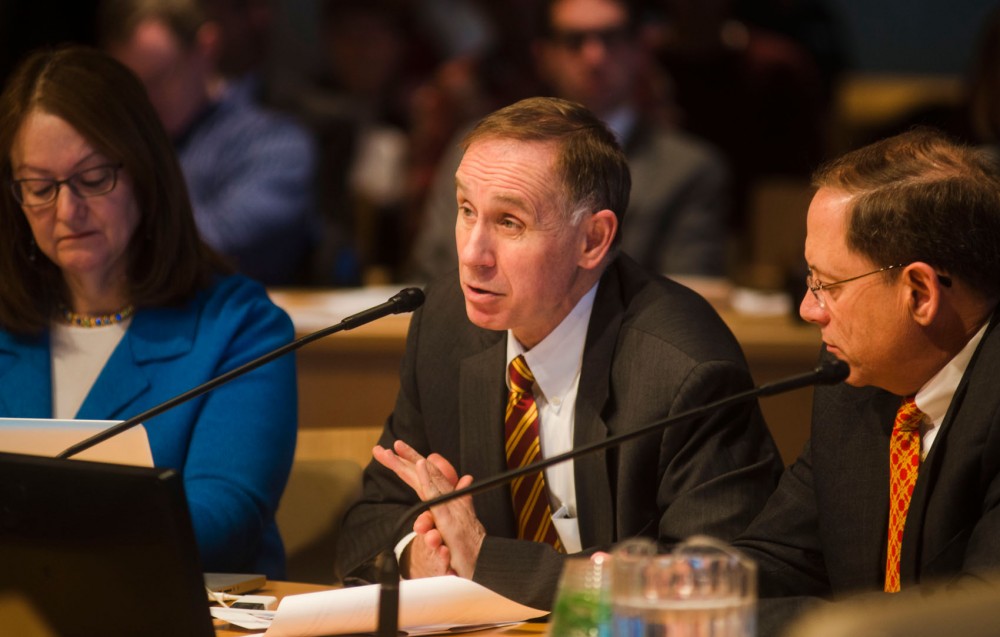The University of Minnesota Board of Regents vowed to make the school’s human research programs “beyond reproach” after two recent reports highlighted ethical concerns and faulted the institution for inadequately protecting its human research subjects.
Regents responded to the reports and approved resulting steps the University will take at a meeting Friday. Among other changes, the board approved suspending psychiatric drug trials and creating a Community Oversight Board to ensure the school’s human research subjects are being properly protected.
The school has postponed 17 current and pending drug trials until an independent review board recommends lifting the suspension. Additionally, other clinical studies that target vulnerable populations will be reviewed to ensure human research subjects’ protections are adequate.
“Obviously, like everyone else, we would have loved to have avoided the issue,” Regent Darrin Rosha said Friday. “But in this circumstance we have an opportunity to make great strides.”
The University will hold a public forum in May to discuss the reports’ findings. Medical School Dean Brooks Jackson will hold a town hall meeting next month with Academic Health Center faculty and staff to discuss the reports’ findings.
The school plans to commission a task force, composed primarily of faculty members and experts, to create recommendations for the school on how to follow through with an external report’s recommendations by May 15.
A legislative auditor’s report released earlier this month said the University’s responses were “insular” and “defensive” when ethical concerns were raised after the 2004 death of Dan Markingson, a man who killed himself while enrolled in a University antipsychotic drug study.
The auditor’s report followed the release of an external review in February, which examined the University’s human research subject protections program.
The review, managed by the Association for the Accreditation of Human Research Protection Programs, analyzed practices from 2011 to 2014 and found flaws, including a lack of employee ethics training and an insufficient institutional review board.
Though school leaders and administrators have approved plans to reform drug trial programs, some faculty members, advocates and state officials say accountability measures should come from outside the institution.
In his report, Legislative Auditor Jim Nobles suggested state lawmakers enact legislation to hold the school accountable.
He suggested lawmakers pass legislation requiring the University to implement all of the AAHRPP’s recommendations and said the state should oversee future psychiatric drug studies.
Before the release of the state auditor’s report, University administrators and regents bolstered claims of no wrongdoing by pointing to past reviews of the case – reviews that Nobles called “superficial,” or compromised, due to conflicts of interest, in his report.
University President Eric Kaler acknowledged using misleading statements about being investigated and cleared of wrongdoing by the state attorney general to reporters after Friday’s meeting.
“I think there were elements in some of our communications that might have led somebody to believe that it was a full-on attorney general investigation,” Kaler said. “In that sense, that was misleading or inaccurate.”
Still, some longtime critics of the University and its research conduct weren’t satisfied with the school’s response to the reports’ findings.
“I didn’t hear a lot of frank, honest discussion of the very serious nature of the research misconduct that seems to have occurred,” said Leigh Turner, an associate bioethics professor and critic of the University’s research ethics. “The reality is a very serious institutional failure has taken place here. Many people in positions of seniority have had years to address these issues, and they chose not to.”
Mike Howard, a friend of Markingson’s mother, Mary Weiss, said the release of the two external reports and subsequent actions taken by the University are validation of the concerns raised more than a decade ago.
“It’s a little bit late, but obviously it’s a start,” Howard said.


